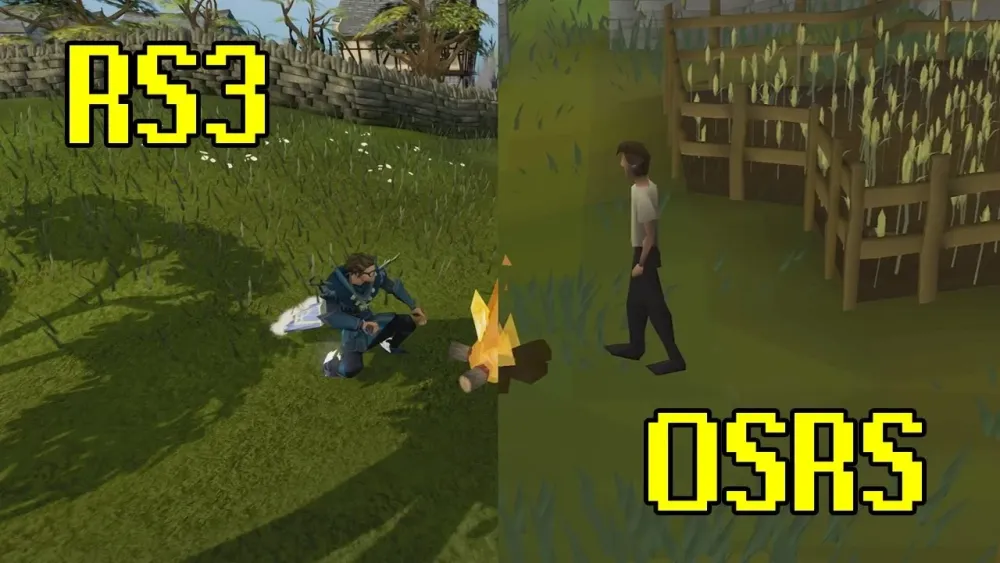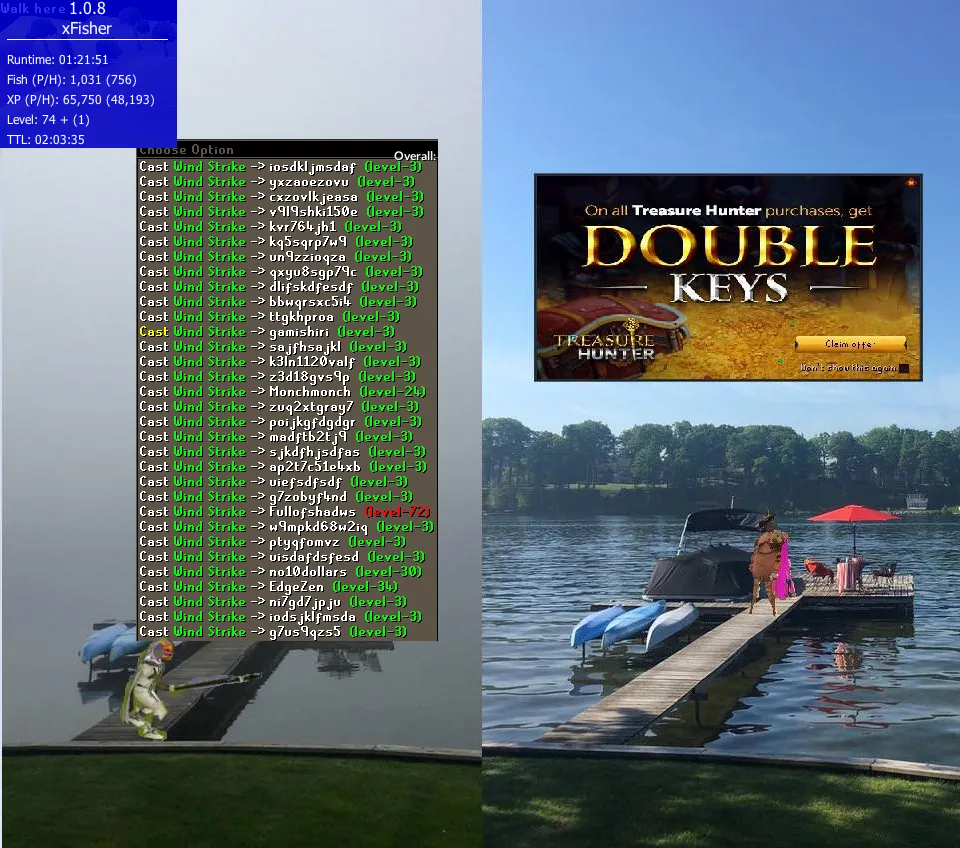Your cart is empty
Is Old School RuneScape More Popular Than RuneScape 3

Warning: Undefined variable $post in /home/osrsmoneymaking.guide/public_html/wp-content/themes/kadence/functions.php on line 391
Warning: Attempt to read property "ID" on null in /home/osrsmoneymaking.guide/public_html/wp-content/themes/kadence/functions.php on line 391
RuneScape, a name synonymous with MMORPGs, has evolved into two distinct versions: Old School RuneScape (OSRS) and RuneScape 3 (RS3). Both games share the same roots but cater to different player preferences, sparking debates about which one holds the crown in popularity. This blog dives into player counts, community engagement, gameplay differences, and more to answer the question: Is OSRS truly more popular than RS3? Let’s explore the data and dynamics behind these two gaming giants.
Before comparing popularity, it’s essential to understand what sets OSRS and RS3 apart. Both games are set in the fantasy world of Gielinor, but their development paths have diverged significantly since OSRS’s release in 2013.
Origins of Old School RuneScape
OSRS is a revival of RuneScape as it existed in 2007, launched after a community vote demanded a nostalgic return to simpler mechanics. It retains retro graphics, a tick-based combat system, and a focus on player-driven updates. Over time, OSRS has added new content, but its core remains rooted in its classic feel.
What Is RuneScape 3
RS3, the modern iteration of RuneScape, evolved from the original game with continuous updates. It boasts enhanced graphics, a complex combat system called Evolution of Combat (EoC), and a broader range of quests and skills. RS3 aims for a polished, contemporary MMORPG experience but has faced criticism for microtransactions.
Player Count and Activity

One of the clearest indicators of popularity is active player count. While Jagex, the developer, doesn’t regularly publish exact numbers, public data and community trackers provide insight.
Concurrent Players
OSRS consistently shows higher concurrent player numbers than RS3. For example, server trackers often report OSRS with 80,000–120,000 players online during peak hours, while RS3 typically ranges between 20,000–40,000. This gap suggests OSRS has a larger active player base.
Trends Over Time
Since OSRS’s launch, its player count has grown steadily, boosted by mobile releases in 2018 and community-driven content like Leagues and Deadman Mode. RS3, while still active, has seen a slower growth rate, with some players citing dissatisfaction with updates like EoC or Treasure Hunter microtransactions.
| Game | Peak Concurrent Players (Approx.) | Mobile Release Impact |
|---|---|---|
| OSRS | 80,000–120,000 | Significant growth |
| RS3 | 20,000–40,000 | Moderate growth |
Community Engagement and Content Creation
Popularity isn’t just about numbers—it’s also about how vibrant a game’s community is. Social media, streaming platforms, and forums offer a window into player engagement.
Social Media Presence
OSRS dominates platforms like Reddit and Twitter. The r/2007scape subreddit, dedicated to OSRS, has over 600,000 members, while r/runescape, which covers RS3 primarily, hovers around 200,000. OSRS memes, updates, and discussions trend more frequently, indicating stronger community buzz.
Streaming and Content Creation
On Twitch and YouTube, OSRS outshines RS3. Streamers like Settled, Odablock, and B0aty attract thousands of viewers with OSRS content, while RS3 streams rarely reach similar heights. YouTube searches for OSRS guides or challenges yield millions of views, compared to RS3’s more modest figures. This disparity highlights OSRS’s appeal to content creators and their audiences.
- Twitch Viewership: OSRS often has 20,000+ viewers; RS3 struggles to hit 5,000.
- YouTube Content: OSRS videos dominate with higher engagement.
- Reddit Activity: OSRS subreddit posts get more upvotes and comments.
Gameplay and Player Preferences
Why does OSRS seem to pull ahead? The answer lies in gameplay differences and what players value in an MMORPG.
Combat Systems
OSRS uses a straightforward, tick-based combat system where timing and strategy matter more than stats. Players enjoy its simplicity and skill ceiling, especially in PvP. RS3’s EoC, with ability bars and complex rotations, feels more like modern MMORPGs but alienated some veterans who preferred the old style.
Graphics and Accessibility
OSRS’s retro visuals evoke nostalgia and run smoothly on low-end devices, broadening its appeal. RS3’s modern graphics, while detailed, require better hardware, potentially limiting its audience. The mobile release of both games leveled the playing field, but OSRS’s low system requirements give it an edge.
Microtransactions and Economy
RS3’s microtransactions, like Treasure Hunter, allow players to buy experience boosts, which many feel undermines the grind. OSRS limits microtransactions to Bonds, preserving a player-driven economy. This difference resonates with players who value earning rewards through effort.
- OSRS Combat: Simple, skill-based, nostalgic.
- RS3 Combat: Complex, ability-driven, modern.
- Microtransactions: RS3’s are more intrusive; OSRS feels fairer.
Updates and Developer Support
How Jagex supports each game influences its longevity and appeal. Both receive updates, but their approaches differ.
OSRS’s Community-Driven Model
OSRS thrives on player polls, requiring 75% approval for major updates. This democratic process ensures content aligns with community desires, fostering loyalty. Events like Trailblazer League or Group Ironman keep players hooked with fresh challenges.
RS3’s Developer-Led Updates
RS3 follows a traditional update model, with Jagex dictating content direction. While it delivers polished expansions like Archaeology or new bosses, some players feel disconnected from decisions, especially when updates prioritize monetization over gameplay.
Cultural Impact and Events
OSRS’s seasonal events, like Deadman Mode tournaments, draw massive attention, often trending online. RS3’s events, while creative, rarely match this cultural impact. OSRS’s ability to capture the gaming zeitgeist gives it a popularity boost.
In conclusion, Old School RuneScape appears more popular than RuneScape 3 based on player counts, community engagement, and cultural relevance. OSRS’s nostalgic charm, accessible gameplay, and community-driven updates resonate with a broader audience. RS3, however, still holds a dedicated fanbase, excelling in modernized features and storytelling. Popularity isn’t a verdict on quality—both games offer unique experiences, and your preference depends on what you seek in Gielinor. Whether you’re grinding in OSRS or questing in RS3, RuneScape’s legacy endures.
Warning: Undefined variable $post in /home/osrsmoneymaking.guide/public_html/wp-content/themes/kadence/functions.php on line 391
Warning: Attempt to read property "ID" on null in /home/osrsmoneymaking.guide/public_html/wp-content/themes/kadence/functions.php on line 391

